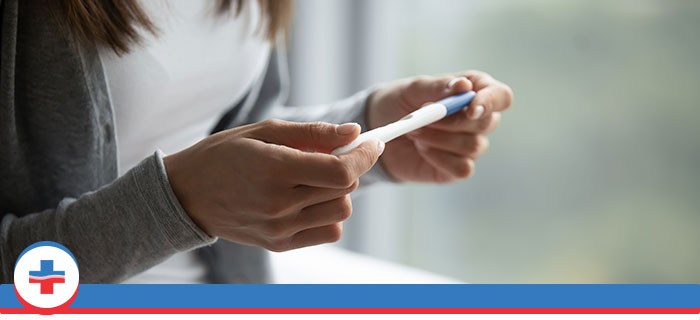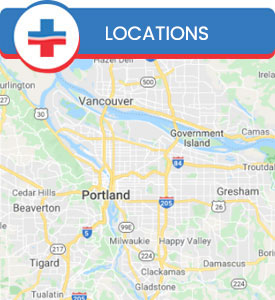Pregnancy Testing Clinic Q&A
To confirm or rule out your pregnancy, Columbia Clinic Urgent Care offers you reliable and private testing services. If you think you might be pregnant, consider visiting our urgent care to get the information and support you need. For more information, contact us or schedule an appointment online. We have convenient locations to serve you in Portland OR and Tigard OR.




Table of Contents:
Can I go to Urgent Care for a Pregnancy Test?
How soon can I take a pregnancy test?
What tests are done to check for pregnancy?
How can I check if I’m pregnant without a pregnancy test?
Pregnancy is an exciting and life-changing event in a woman’s life. However, before you start planning for your pregnancy, it is essential to confirm whether you are pregnant or not. There are various diagnostic tests available to detect pregnancy, ranging from simple home pregnancy tests to more invasive tests performed by healthcare professionals.
Absolutely! Our urgent care is available for anyone that may believe they are pregnant, or showing signs and symptoms of a pregnancy, or if you haven’t had your period in over 6 weeks, contact our clinic, or simply walk in.
Pregnancy tests measure the levels of human chorionic gonadotropin (HCG) in a person’s urine or blood. HCG is a hormone that is produced when a fertilized egg implants in the uterus. The hormone is detectable in a person’s urine or blood within a few days after implantation. Most pregnancy tests are designed to detect HCG in urine. However, some tests can detect the hormone in the blood, which is more accurate than urine tests. Blood tests can detect HCG earlier than urine tests, as early as six to eight days after ovulation. It is important to note that some medications, such as fertility drugs, can increase HCG levels and give a false positive result.
The accuracy of a pregnancy test depends on the timing of the test around the person’s menstrual cycle. Taking a pregnancy test too early can result in a false negative while waiting too long can result in a false positive. A false negative occurs when a person is pregnant, but the test does not detect HCG in their urine or blood. This could be because they took the test too early, and their HCG levels were not high enough to be detected. It is recommended to wait at least a week after a missed period to take a pregnancy test to reduce the chances of a false negative. On the other hand, a false positive occurs when a person is not pregnant, but the test detects HCG in their urine or blood. This can happen when a person takes the test too soon after stopping birth control pills, or when they have a medical condition that produces HCG, such as a tumour.
The timing of a pregnancy test also depends on the type of test used. Some tests are more sensitive than others and can detect lower levels of HCG in a person’s urine or blood.
The most commonly used diagnostic test for pregnancy is a urine or blood test that detects the presence of the hormone human chorionic gonadotropin (HCG). This hormone is produced by the placenta after the fertilized egg implants in the uterus. Home pregnancy tests are convenient and affordable, as they can be performed at home and provide quick results. However, the accuracy of home pregnancy tests may vary depending on the brand and the sensitivity of the test. False-negative results may occur if the test is taken too early after conception, or if the urine sample is diluted. False positive results may occur if the woman is taking fertility drugs or has a medical condition that produces HCG.
Other diagnostic tests for pregnancy, such as ultrasound and amniocentesis, can provide additional information about fetal development and health. Ultrasound is a non-invasive imaging test that uses high-frequency sound waves to create pictures of the inside of the uterus. Ultrasound can confirm pregnancy, determine gestational age, and detect any abnormalities or complications. Amniocentesis is a more invasive test that involves inserting a needle through the abdominal wall and into the uterus to extract a small sample of amniotic fluid. This test can detect genetic disorders and chromosomal abnormalities in the fetus. However, amniocentesis carries a small risk of miscarriage and should only be performed when medically necessary.
Apart from the diagnostic tests mentioned above, other tests can be performed during pregnancy to monitor the health of the mother and the fetus. These tests include non-stress tests, biophysical profiles, and fetal echocardiography. Non-stress tests are used to monitor the fetal heart rate and movement, while biophysical profiles evaluate the fetals well-being by measuring the fetal heart rate, breathing, movement, muscle tone, and the amount of amniotic fluid. Fetal echocardiography is a specialized ultrasound that focuses on the fetal heart and can detect any structural abnormalities or defects.
There are various diagnostic tests available for pregnancy, ranging from simple home pregnancy tests to more invasive tests performed by healthcare professionals. While home pregnancy tests are convenient and affordable, they may not be as accurate as tests performed by healthcare professionals. Other diagnostic tests, such as ultrasound and amniocentesis, can provide additional information about fetal development and health. It is important to discuss the options with your healthcare provider and choose the most appropriate test for your individual needs.
The most common early pregnancy signs and symptoms include:
– Missed period
– Tender, swollen breasts
– Nausea with or without vomiting
– Increased urination
– Fatigue
If you are planning your pregnancy journey or if you detect that you may be pregnant, contact our clinic for an appointment for a pregnancy test. We can confirm pregnancies with our testing features and help you along the way. For more information, contact us or schedule an appointment online. We serve patients from Portland OR, PDX, Happy Valley OR, Tigard OR, Milwaukie OR, Cedar Hills OR, Cedar Mill OR, Lake Oswego OR, Oak Grove OR, Vancouver WA, Aloha OR, Minnehaha WA, Gladstone OR, Tualatin OR, West Linn OR, Fairview OR, Oregon City OR.


